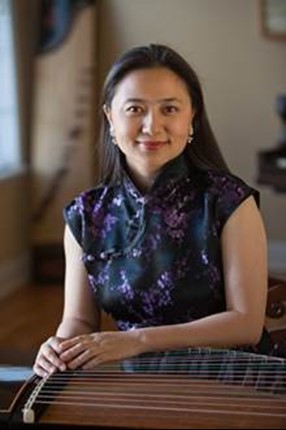Haiqiong Deng
2017 Florida Folk Heritage Award

Haiqiong Deng was born in Lanzhou, China, where she began studying zheng music at an early age. The zheng is a plucked, 21-stringed instrument with a resonant body. The zheng is considered the ancestor of other Asian zithers such as the Japanese koto, Korean gayageum and Vietnamese dàn tranh, and the history of the instrument itself can be traced back over 2,500 years. Traditionally, this music was shared orally in small communities, creating regional variations and stylistic differences. More recently, Chinese universities have conducted comprehensive research on various styles of zheng music and invited leading masters to teach in conservatories. Deng went on to attend the Shanghai Conservatory of Music where she studied under these master musicians and received a Bachelor of Music degree in zheng performance.
Deng made her professional debut in Beijing in 1997, and since has developed an international reputation as a soloist and chamber musician with numerous performances throughout China, Japan, Singapore and North America including a debut at Carnegie Hall in 2003. She now holds a master’s degree from Florida State University, is the Director of the Chinese Music Ensemble there and is pursuing a Ph.D. in Musicology.
Driven by a passion to share this music, Deng has given hundreds of performances at concert halls and universities, worked with various composers and taught numerous students. As the Director of the Chinese Ensemble, she works with Chinese-American students and uses music as a tool to reinforce their knowledge and appreciation of their cultural heritage. Among her latest projects is an educational series called Echoes of Nature that combines three key aspects of Chinese culture: music, calligraphy and art. Through creative partnerships and collaborations, both with well-known composers and with master musicians in other genres, Deng actively promotes traditional Chinese music and explores the boundaries of musical expression.

